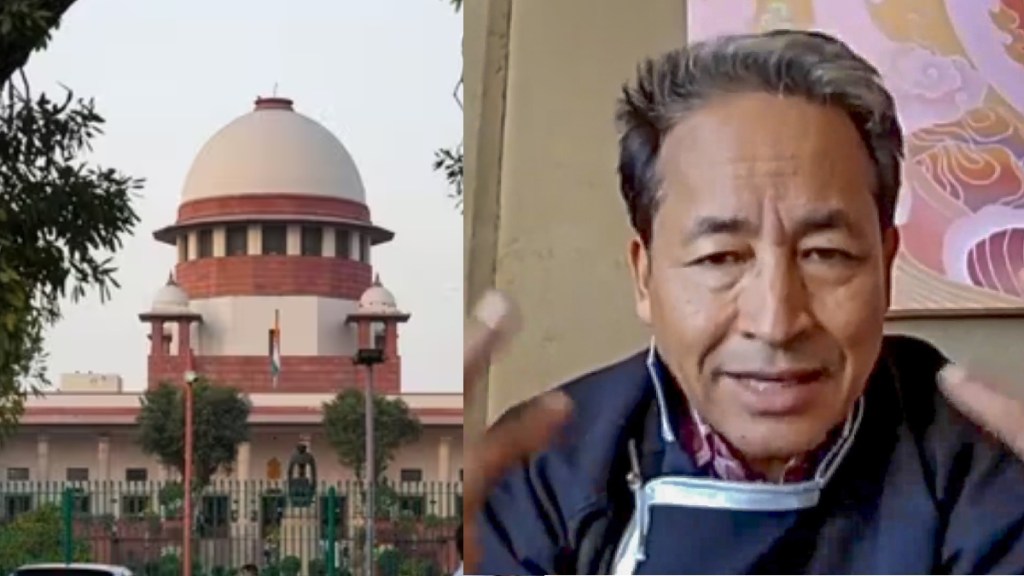The Supreme Court on October 6 issued a notice to the Central Government against the petition filed by Gitanjali Angmo, wife of Ladakh activist and education reformer Sonam Wangchuk. The petition challenges his detention under the National Security Act (NSA) following recent violent clashes in Ladakh. A bench of Justices Aravind Kumar and NV Anjaria said the matter will be heard next Tuesday, October 14.
The court also questioned why Gitanjali was not given prior notice explaining the grounds for her husband’s detention. In her plea, she said she has not yet been allowed to meet Wangchuk. Notices were also issued to the governments of Jammu & Kashmir and Rajasthan in connection with the habeas corpus petition. The habeas corpus petition, filed under Article 32 of the Constitution, was submitted on October 2 following his arrest on September 26.
Wife of Sonam Wangchuk terms detention ‘Illegal’
In her petition challenging the detention, Angmo said, “Along with the illegal detention of Shri Sonam Wangchuk, a systematic, untruthful and false campaign has been unleashed against him and his colleagues.”
The petition further states, “In particular, a blasphemous narrative suggesting links with Pakistan and China is being intentionally floated in certain quarters with the sole object of defaming, maligning and discrediting a peaceful Gandhian movement for the protection of Ladakh, its fragile ecology, its mountains, glaciers, and the livelihood of its people.”
The plea also criticised the “malicious propaganda” as “dangerous,” stating, “As it seeks to stigmatise democratic dissent and portray environmental activism as anti-national, when in reality Shri Wangchuk has consistently worked for strengthening national unity and has been a supporter of the Indian Army through innovations such as high-altitude shelters and grassroots mobilisation in border areas.” It further added that his “detention is not only an affront to his rights but is inflicting a profound emotional injury on the collective conscience of Ladakh.”
Why and when Sonam Wangchuk was detained?
Wangchuk was taken into custody after protests in Leh demanding statehood for Ladakh turned violent on September 24. During the clashes, protestors allegedly set fire to the BJP headquarters in the town, leaving several people dead and injured. Authorities claim that Wangchuk had a major role in instigating the crowd.
Soon after his detention, the Ladakh administration accused him of using provocative language in his speeches, including references to “self-immolation,” similar to protest methods seen in Tibet. Officials said this rhetoric posed a serious threat to public order.
The administration later confirmed that the formal grounds of detention were served to Wangchuk, who continues to be held under the NSA — a law that allows preventive detention for reasons of national security or public safety.
The protests in Leh on September 24 took a violent turn when people demanding full statehood for Ladakh clashed with the police. In the chaos, four people were killed, and several others were injured after police opened fire. Following the violence, authorities imposed a curfew and suspended internet services in the area.
Officials later accused Wangchuk of being one of the key figures behind the unrest.
Government crackdown and MHA statement
The Union Home Ministry (MHA) issued a statement blaming Wangchuk for making “provocative statements” that led to mob violence.
According to the ministry, “On September 24, around 11:30 AM, a mob motivated by his speeches attacked a political party office and the office of the Chief Executive Councillor in Leh. They set both offices on fire, attacked security personnel, and torched a police vehicle.”
In addition to his detention, the government also cancelled the FCRA licence of Wangchuk’s NGO — the Students’ Educational and Cultural Movement of Ladakh (SECMOL), citing repeated violations of foreign funding regulations. The organisation, founded nearly three decades ago, has been known for its work in alternative education, environment protection, and youth empowerment in Ladakh.
Wangchuk’s message from jail
From Jodhpur jail, Wangchuk sent a message to the people of Ladakh urging them to stay peaceful and united while continuing their demand for statehood “in a true Gandhian and non-violent way.”
His message was shared by Haji Mustafa, the legal advisor of the Leh Apex Body, after meeting Wangchuk in jail along with his elder brother, Ka Tsetan Dorjey Ley.
Wangchuk also called for an independent judicial inquiry into the deaths of the four people during the protests, saying, “Unless there is a fair inquiry, I am prepared to remain in jail.”

